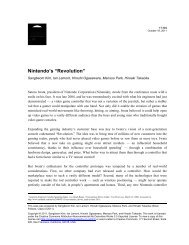Sony's Battle for Video Game Supremacy - MIT Sloan School of ...
Sony's Battle for Video Game Supremacy - MIT Sloan School of ...
Sony's Battle for Video Game Supremacy - MIT Sloan School of ...
You also want an ePaper? Increase the reach of your titles
YUMPU automatically turns print PDFs into web optimized ePapers that Google loves.
SONY'S BATTLE FOR VIDEO GAME SUPREMACY<br />
John Sterman, Kahn Jekarl, Cate Reavis<br />
The s<strong>of</strong>tware sales decline was mostly due to the industry’s transition to the next generation <strong>of</strong><br />
gaming hardware. Those consumers interested in purchasing a gaming console were willing to hold<br />
<strong>of</strong>f a year until the next generation had arrived, while those with current generation consoles such as<br />
the Xbox and PS2 were reluctant to purchase new s<strong>of</strong>tware <strong>for</strong> a system that would soon be outdated.<br />
Most industry <strong>for</strong>ecasts, however, were very optimistic, with firms such as PricewaterhouseCoopers<br />
4<br />
estimating that the industry would grow to $46 billion by 2010 (11.4% CAGR).F F<br />
The industry had traveled leaps and bounds from the days when Atari was providing U.S. households<br />
with the newest and greatest inventions in electronic entertainment.<br />
6BThe Rise and Fall <strong>of</strong> Atari<br />
In 1966, an engineer at Sanders Associates, a small New Hampshire-based electronics company,<br />
developed Odyssey, the first home video game system. A ball-and-paddle game that could be played<br />
on a TV set, the Odyssey achieved limited commercial success. Its successor Pong, however, did<br />
extremely well in arcades and the home market. Nolan Bushnell, founder <strong>of</strong> Atari, oversaw the<br />
development <strong>of</strong> Pong and introduced the home version in 1975. Atari sold 150,000 copies <strong>of</strong> Pong in<br />
the first year.<br />
Electronics manufacturers quickly saw the benefits <strong>of</strong> producing a console that could play multiple<br />
games. In 1976, Fairchild, a U.S. electronics company, developed the first console <strong>of</strong> this kind<br />
naming it the Fairchild Channel F. Atari quickly followed suit with its 2600 VCS (“video computer<br />
system”). In late 1977, Atari released the VCS <strong>for</strong> $199 with a library <strong>of</strong> nine titles. Each cartridge<br />
cost $5-$10 to manufacture and retailed <strong>for</strong> $25-$30.<br />
By 1979, many other electronics and toy companies were entering the home console market including<br />
Mattel, Coleco, RCA, and Philips Electronics. Despite the new entrants, Atari represented two-thirds<br />
<strong>of</strong> the home console market in the United States. Home versions <strong>of</strong> hit arcade games such as Space<br />
5<br />
Invaders and Asteroids grew the game industry into a $3 billion business by 1982.F<br />
By the end <strong>of</strong> 1983, however, the industry had collapsed. The market had been saturated with<br />
multiple consoles and poor quality s<strong>of</strong>tware, killing consumer appetite <strong>for</strong> games altogether. In one<br />
notable example, Atari developed E.T., a game based on Steven Spielberg’s hit movie by the same<br />
name. With only one month to deliver a game in time <strong>for</strong> the holiday season, the development team<br />
created an extremely poor title. Atari took such an enormous loss on E.T. due to unsold inventory<br />
and a large licensing fee that it ended up dumping five million <strong>of</strong> copies into a landfill in New<br />
6<br />
Mexico.F F In<br />
1983, Atari posted a $536 million loss and the company was sold at a substantial<br />
4 PricewaterhouseCoopers, Global Entertainment and Media Outlook: 2006-2010<br />
5 Mark Mayfield, “What Your Kids Want,” USA Today, December 2, 1988.<br />
6 Ronald Grover and Cliff Edwards, “<strong>Game</strong> Wars,” Business Week, February 28, 2005.<br />
Rev: December 8, 2011 4
















